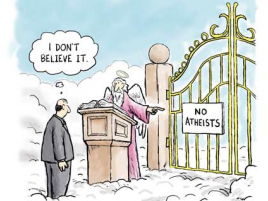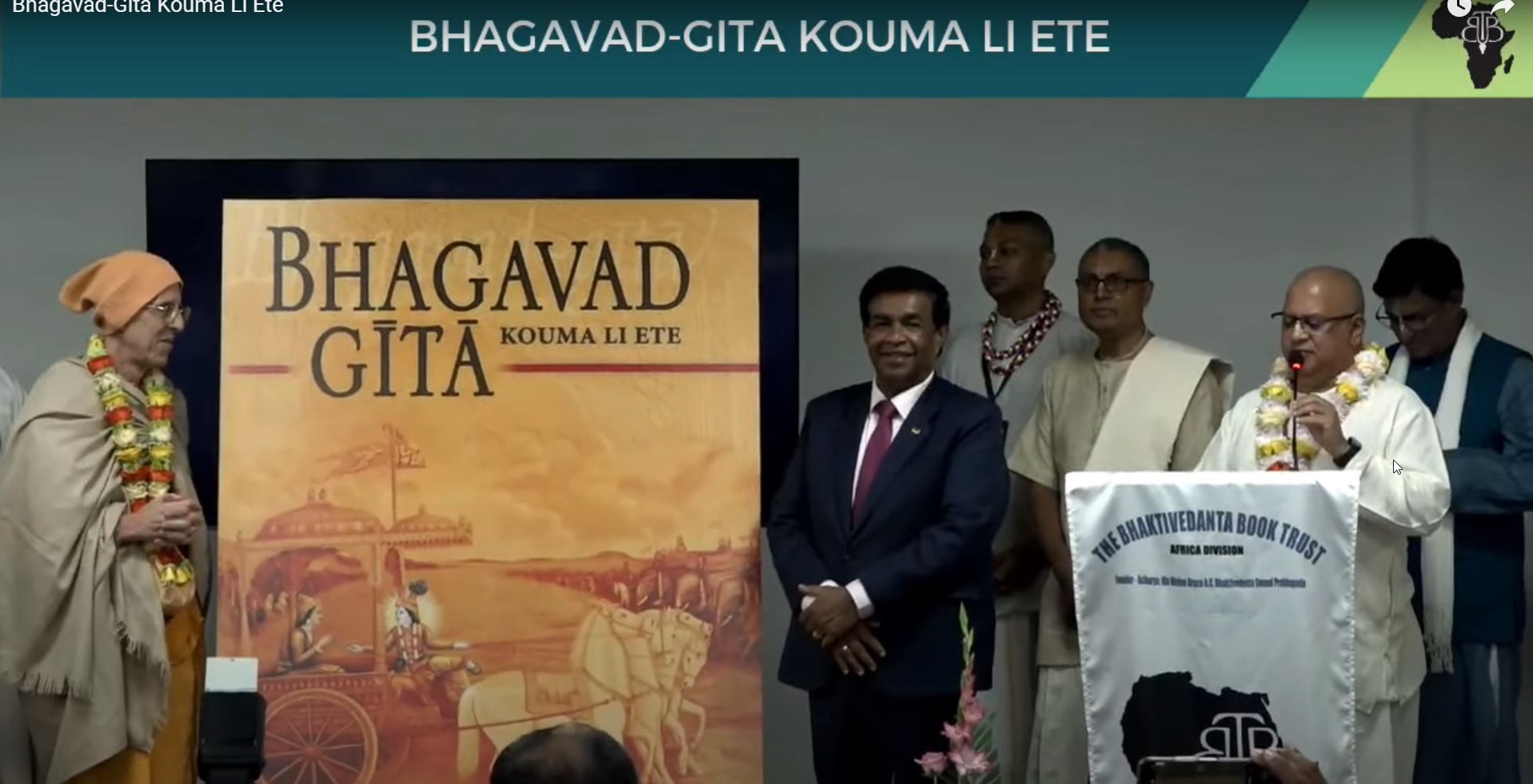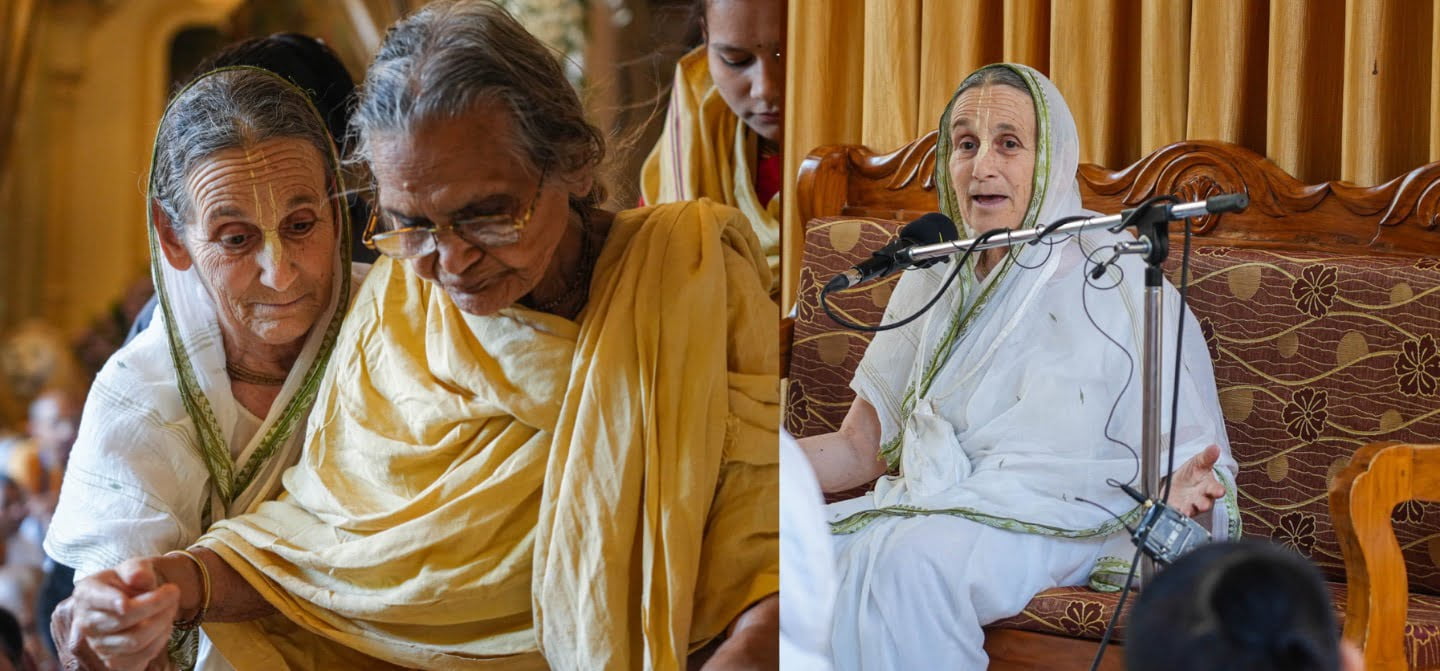Turned Off by Religion
By Keshava Krishna Das | Dec 16, 2010

Has anyone heard the story of a devout atheist who became convinced that he was God after meeting a Hindu? While certain free-thinkers and skeptics are susceptible to changes of belief, many of them are intelligent and caring people, in the material sense.
Bertrand Russell explains: “Three passions, simple but overwhelmingly strong, have governed my life: the longing for love, the search for knowledge, and unbearable pity for the suffering of mankind.”
Being a vowed atheists or agnostics does not always mean being tyrants like Nero, Caligula or Stalin. “I refuse to be labeled immoral because I am Godless,” is a usual response to pious accusations given by religionists perhaps a little too sure of themselves.
To such people, like Gore Vidal retorted: “I am a born-again atheist.” Here is another demeaning remark: “I always like a dog so long as he isn’t spelled backwards.” (G. K. Chesterton)
In fact, one of the main causes of disbelief among intellectuals is the attitude of smug believers and what they believe in. We have to admit that religion infiltrated with man-made ideals and which has a tainted history, does not appeal to them. It is also off-putting when people who want to share their religion with you almost never want to share yours with them.
What are ‘religious’ people capable of? “Men never do evil so completely and cheerfully as when they do it from a religious conviction.” (Pascal, 1670) Here is another shared perception: “Men will wrangle for religion; write for it; die for it; anything but live for it.” (C. C. Colton)
Doesn’t Srimad Bhagavatam reject man-made motivated religion? Perhaps some of these thinkers are on to something when they warn about these things. “You can safely assume that you’ve created God in your own image when it turns out that God hates the same people as you do.” (Anne Lamott)
Is there enough love in this world of ours? “We have just enough religion to make us hate, but not enough to make us love one another.” (Jonathan Swift, 1711)
Of course, believers can get defensive when certain strange beliefs are examined. For many, religion is answers that can never be questioned. We may ask, if people do not want their beliefs laughed at, why do they have funny beliefs? But then, “It is a test of a good religion whether you can joke about it.” (G. K. Chesterton)
Sadly though, fear reigns when reason fails. “God is a comedian playing to an audience too afraid to laugh.” (Voltaire) Here is some wisdom from Thomas Jefferson: “Question with boldness even the existence of God; because if there be one, he must more approve of the homage to reason, than that of blind-folded fear.” So where does the theory that religious people are meant to be happier than Godless people fit in?
George Bernard Shaw had an answer: “The fact that a believer is happier than a skeptic is no more to the point than the fact that a drunken man is happier than a sober one.” Can we be certain about this? Or is “certainty” a dirty word for some?
“The whole problem of the world is that fools and fanatics are so certain of themselves, but wiser people so full of doubts.” (Bertrand Russell) Thomas Jefferson waded in here back in 1785: “What has been the effect of religious coercion? To make half the world fools, and the other half hypocrites.”
With utmost certainty, how many believers answer “Yes” when asked if they have seen God face to face? The very wise Six Goswamis of Vrndavana never claimed to have seen God: “O Queen of Vrndavana, Radharani! O Lalita! O Son of Nanda Maharaja! Where are you all now? Are you just on the hill of Govardhana, or are you under the trees on the bank of the Yamuna? Where are you?” (Sri Sri Sad-Goswami Astakam)
The difference between philosophy and religion can be quite telling. “A little philosophy inclineth men’s minds unto atheism, but depth in philosophy bringeth men’s minds about to religion.” (Francis Bacon, 1625) But still, does the rational side of man benefit our world? Not according to Bertrand Russell: “It has been said that man is a rational animal. All my life I have been searching for evidence of this.”
Elsewhere, the same Mr. Russell gave quite a succinct piece of rationality on how to become happy: “The secret to happiness is to face the fact that the world is horrible.” That he could say something like this must be attributed to this: “In some awful, strange, paradoxical way, atheists tend to take religion more seriously than the practitioners.” (Jonathon Miller)
On this note some hints of religiosity pierces through the vagaries of voidist and impersonal atheist thought: “My religiosity consists in a humble admiration of the infinitely superior spirit that reveals itself in the little that we, with our weak and transitory understanding, can comprehend of reality. Morality is of the highest importance, but for us, not for God.” (Albert Einstein)
Since morality ranks highly for humanists and free-thinkers alike they have little time for man-made religion: “You never see animals going through the absurd and often horrible fooleries of magic and religion. Only man behaves with such gratuitous folly. It is the price he has to pay for being intelligent, but not, as yet, intelligent enough.” (Aldous Huxley)
With many cases of religious extremism tormenting or instilling fear into people we can hardly blame certain bright thinkers for their agnosticism: “Religion is a fashionable substitute for belief.” (Oscar Wilde)
With all these quotes we can better understand the frustration of thinking people. If given a credible, intelligible presentation of genuine spirituality they may happily apply themselves. They want the truth just as much as spiritual seekers want it: “There’s something in every atheist itching to believe, and something in every believer itching to doubt.” (Mignan McClauglin)
These itchy sentiments can manifest as almost religious feelings: “The most valuable things in life are not measured in monetary terms. The really important things are not houses or lands, stocks and bonds, automobiles and real estate, but friendship, trust, confidence, empathy, mercy, love and faith.” (Bertrand Russell)
While attempting to relieve their itch for truth the usual temptations for being a controller can impede the flow. Just as the atheist was made a ‘God’ by a Hindu, Mr. Russell had a bigger chance at Godhood: “I was told that the Chinese said they would bury me by the Western Lake and build a memorial to my memory. I have some slight regret that this did not happen, as I might have become a God, which would have been very chic for an atheist.”
In the face of large-scale intellectual skepticism, how does Krishna consciousness fare? The secret it seems is in allowing our desirable human nature to shine through. People of doubt can sometimes have an uncanny ability to distinguish between sincerity and motivated religious following. These human qualities may well lead others to have faith in humanity again, which reflect the all-loving attraction of our dearest friend, Lord Sri Krishna.
The human touch can eventually cause further inquiry into the philosophy behind such behavior. The “real thing” is simply a pure, human touch away.












